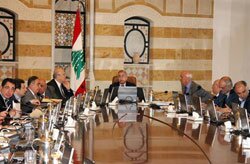
The Cabinet’s decision Thursday to allocate LL10.394 trillion ($6.8 billion) to cover the expenses of all ministries for the rest of this year has temporarily breathed life into a government that was severely hamstrung by a lack of authorized funds.
After weeks of intense mediations led by Speaker Nabih Berri, members of the government, realizing that their wrangling over every issue was affecting their credibility even among their own supporters, agreed for the first time to set aside their differences on the issue of extra-budgetary spending.
According to the agreement reached in Cabinet, the new allocations, which will be financed with the issuance of treasury bonds, will be sent to the parliament for a vote in the next two weeks.
If the Cabinet fails to ensure a quorum in Parliament, Berri will send the bill to President Michel Sleiman to use his prerogatives and sign it into law.
The president has 40 days to sign the bill, and sources close to the government are confident that Sleiman will sign the proposal after giving assurances to all ministers that he would hereafter facilitate the work of the Cabinet.
With the approval of LL150 billion in advance payments, Cabinet also gave Mikati a generous gift which he can utilize in the next parliamentary elections to finance pressing development projects in his hometown of Tripoli.
The ministers also approved another advance payment of LL450 billion to finance other projects in different areas of Lebanon.
The Cabinet will discuss next week Finance Minister Mohammad Safadi’s 2012 draft budget, which calls for a series of taxes.
But most ministers are not keen to give their seal of approval for the new draft budget unless Safadi drops plans to raise the value added tax from 10 percent to 12 percent.
Mikati, according to sources close to him, is also reluctant to slap higher taxes on interest on customer deposits, a move that will likely irritate Lebanese banks, which fear such a step would dissuade potential customers from making deposits in Lebanon.
Economist Ghazi Wazneh told The Daily Star the allocations of funds for the ministries would give the government ample time to implement pressing projects before the end of this year.
“I don’t think the government is in a hurry to pass the draft budget after securing more than LL10 trillion in funds to finance the projects. What is more important is that the government will have more than LL1.8 trillion which will be used to finance infrastructure projects,” Wazneh explained.
He said the allocations would not affect the public debt or budget deficit because the government had no problem in funding projects this year.
“This is the first step to legalize spending. The original draft budget calls for LL20 trillion divided between revenues and expenditures. They [Cabinet] have already spent LL10 trillion in accordance with the last budget which was officially approved in 2005. Now they have received permission to spend the remaining LL10 trillion,” he said.
March 14 and even the bloc of Druze leader Walid Jumblatt insisted on passing in one shot both the $11 billion which were spent by the governments of former Prime Ministers Fouad Siniora and Saad Hariri and the overspending request by the current government.
But observers say the allocations of funds would allow Mikati and the ministers to proceed with their projects this year without the need to make any compromises with March 14 on overspending bills.
Mikati said the government could do without additional taxes this year since the funds were available. He added that the new allocations would cover funding of investment projects as well as the salary increases for government employees, which will cost more than LL1 trillion a year.
“The budget deficit this year will be in line with the projected deficit of LL5.6 trillion. This means the deficit will not rise above this ceiling since the allocations have been previously approved by the former government,” Wazneh said.
“These proposed taxes do not serve social justice because they will only affect the individual ... and [increasing the VAT rate] will deepen the social inequalities,” he warned, instead proposing a 20 percent tax on the profits of real estate companies.












